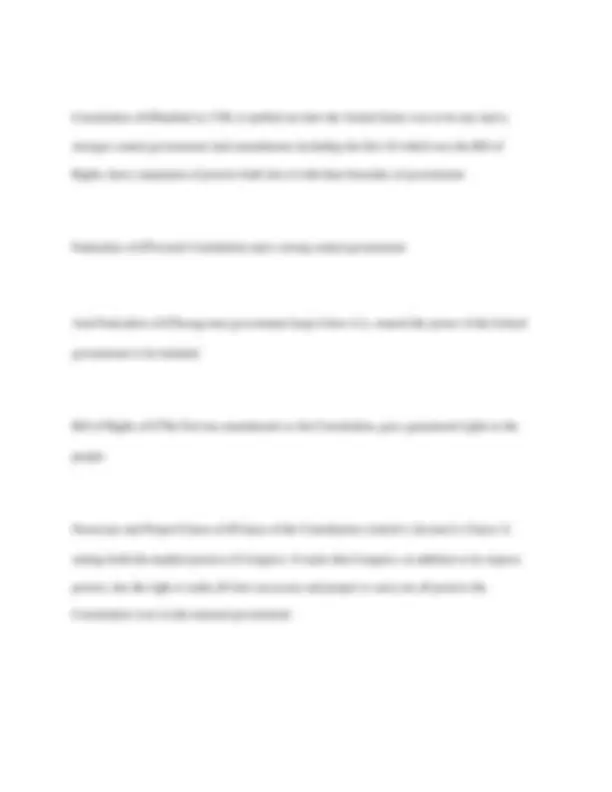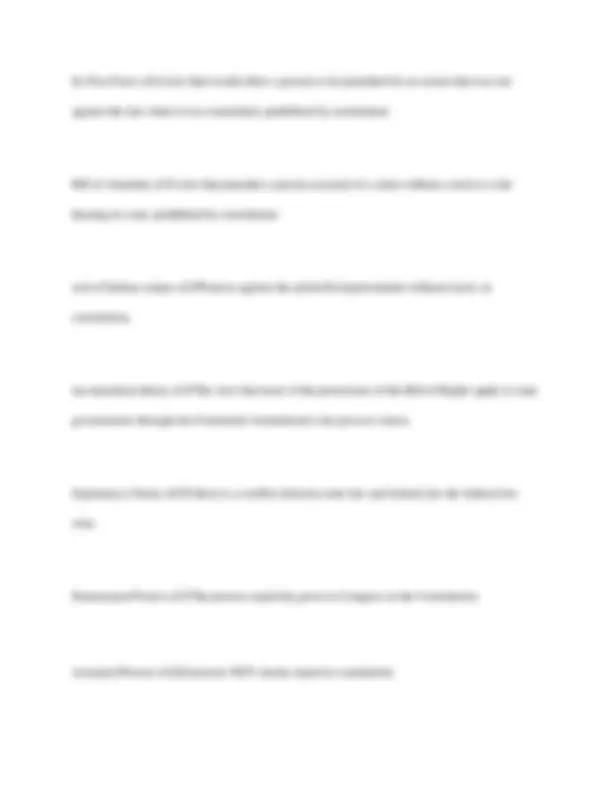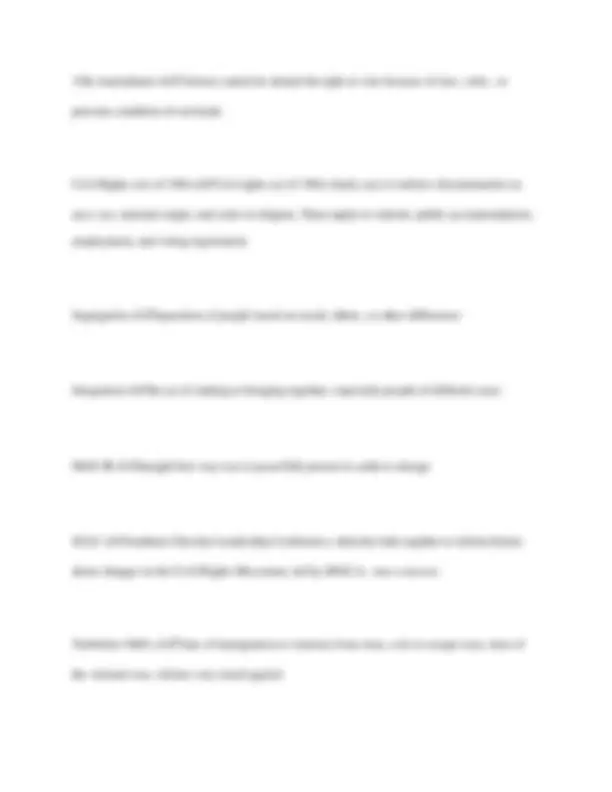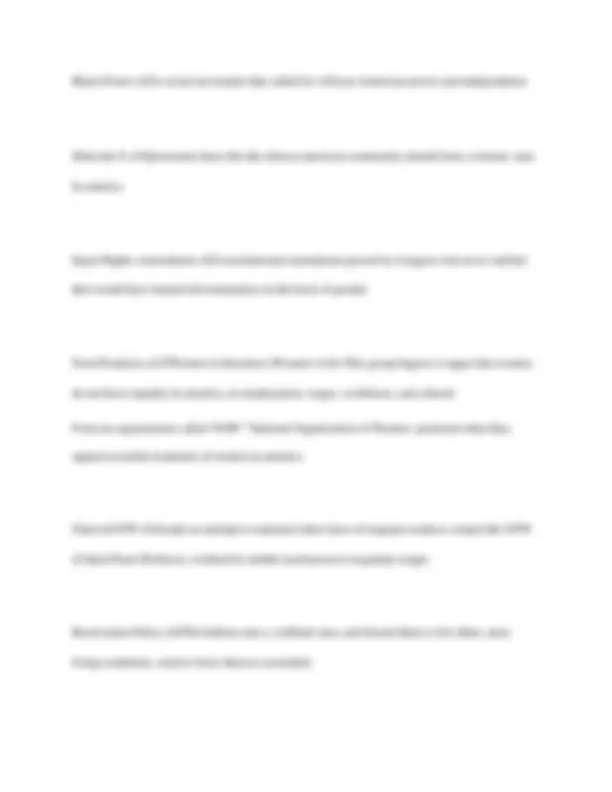








Study with the several resources on Docsity

Earn points by helping other students or get them with a premium plan


Prepare for your exams
Study with the several resources on Docsity

Earn points to download
Earn points by helping other students or get them with a premium plan
Community
Ask the community for help and clear up your study doubts
Discover the best universities in your country according to Docsity users
Free resources
Download our free guides on studying techniques, anxiety management strategies, and thesis advice from Docsity tutors
A comprehensive review of key concepts and terms for pols 101 exam 1, covering fundamental principles of us government, including systems of government, constitutional history, civil rights, and landmark supreme court cases. It includes definitions, explanations, and answers to review questions, making it a valuable resource for students preparing for the exam.
Typology: Exams
1 / 11

This page cannot be seen from the preview
Don't miss anything!







Unitary System of Government ✔✔type of government that centralizes all the powers of government into one central authority
Federal System of Government ✔✔a system in which power is shared among state and national authorities
Democracy ✔✔nation ruled by the people
Direct Democracy ✔✔everyone makes the decision on laws
Representative Democracy ✔✔people elect representatives to vote for them on laws
Communism ✔✔Classless society where everyone is equal, there is no need for government, military, or police force. This is because everyone is equal and everyone would share their goods
Socialism ✔✔The government should control all means of communication, transportation, and production of goods. In the goal of making all people equal.
Declaration of Independence ✔✔the document recording the proclamation of the second Continental Congress (4 July 1776) asserting the independence of the colonies from Great Britain
Inalienable Rights ✔✔rights the government cannot take away that we have at birth no matter what
John Locke ✔✔English philosopher who advocated the idea of a "social contract" in which government powers are derived from the consent of the governed and in which the government serves the people; also said people have natural rights to life, liberty and property.
Federalism ✔✔Strong national government that works with state governments to govern, if a state law ever goes against a federal law, the federal government wins
Constitution ✔✔Ratified in 1788, it spelled out how the United States was to be run, had a stronger central government, had amendments including the first 10 which was the Bill of Rights, had a separation of powers built into it with three branches of government
Federalists ✔✔Favored Constitution and a strong central government
Anti-Federalists ✔✔Strong state government keep it how it is, wanted the power of the federal government to be minimal
Bill of Rights ✔✔The first ten amendments to the Constitution, gave guaranteed rights to the people
Necessary and Proper Clause ✔✔Clause of the Constitution (Article I, Section 8, Clause 3) setting forth the implied powers of Congress. It states that Congress, in addition to its express powers, has the right to make all laws necessary and proper to carry out all powers the Constitution vests in the national government
Ex Post Facto ✔✔a law that would allow a person to be punished for an action that was not against the law when it was committed, prohibited by constitution
Bill of Attainder ✔✔a law that punishes a person accused of a crime without a trial or a fair hearing in court, prohibited by constitution
writ of habeas corpus ✔✔Protects against the unlawful imprisonment without travel, in constitution
incorporation theory ✔✔The view that most of the protections of the Bill of Rights apply to state governments through the Fourteenth Amendment's due process clause.
Supremacy Clause ✔✔If there is a conflict between state law and federal law the federal law wins
Enumerated Powers ✔✔The powers explicitly given to Congress in the Constitution.
Assumed Powers ✔✔all powers NOT clearly stated in constitution
Reserved Powers ✔✔Powers not specifically granted to the federal government or denied to the states belong to the states and the people
Eminent Domain ✔✔Power of a government to take private property for public use
Civil Liberties ✔✔Rights and freedoms guaranteed by the constitution, and court decisions centered around those guarantees
Civil Rights ✔✔Policies designed to protect people against arbitrary or discriminatory treatment by government officials or individuals.
13th Amendment ✔✔abolished slavery
14th Amendment ✔✔All persons born or naturalized in the United States and are subject to the jurisdiction of the United States are citizens of the United States and the state in which they reside. No state shall make or enforce any law which shall alter the privileges or immunities of citizens of the United States.
15th Amendment ✔✔Citizens cannot be denied the right to vote because of race, color , or precious condition of servitude
Civil Rights Act of 1964 ✔✔Civil rights act of 1964 clearly says it outlaws discrimination on race, sex, national origin, and color or religion, These apply to schools, public accommodations, employment, and voting registration
Segregation ✔✔Separation of people based on racial, ethnic, or other differences
Integration ✔✔the act of uniting or bringing together, especially people of different races
MLK JR ✔✔thought best way was to peacefully protest to achieve change
SCLC ✔✔Southern Christian Leadership Conference, churches link together to inform blacks about changes in the Civil Rights Movement, led by MLK Jr., was a success
Turbulent 1960's ✔✔Time of immigration to America from Asia, a lot to escape wars, time of the vietnam war, citizens very much against
Dawes Act ✔✔1887 law that distributed reservation land to individual Native American owners
Marbury v. Madison ✔✔This case establishes the Supreme Court's power of Judicial Review
Mculloch v. Maryland ✔✔Maryland wanted to tax federal bank in Maryland, said it was unfair, Supremacy clause wins out saying federal wins, established federal law over state law
Plessy v. Ferguson ✔✔Separate is ok as long as it was equal
Ogden v. Gibbons ✔✔Says that the federal government has the power to regulate commerce
Dred Scott Case ✔✔Supreme Court case which ruled that slaves are not citizens but are property, affirmed that property cannot be interfered with by Congress, slaves do not become free if they travel to free territories or states, fueled abolitionist movement, hailed as victory for the south
Brown v. Board of Education ✔✔Supreme Court said school systems in the United States must integrate their student body
Roe vs. Wade ✔✔the U.S. supreme Court ruled that there is a fundamental right to privacy, which includes a woman's decision to have an abortion. Up until the third trimester the state allows abortion. Now overturned
Miranda Case ✔✔court ruled that when a person is arrested, police must inform him or her of the constitutional rights to remain silent and to have the advice of a lawyer, protects against coerced confession